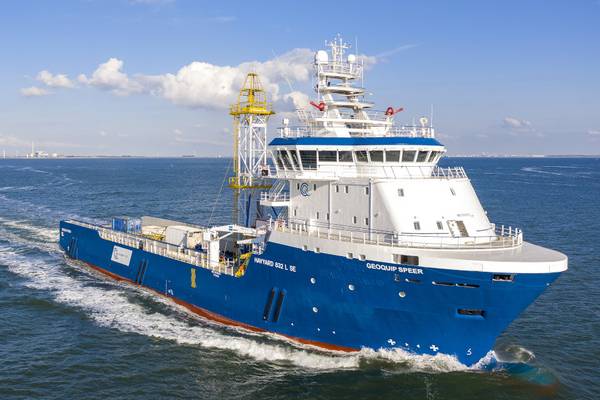
Switzerland-based offshore geotechnical engineering and drilling company Geoquip Marine said it has secured a contract to work on the development of the Coastal Virginia Offshore Wind (CVOW) commercial project being developed by Dominion Energy off the coast of Virginia Beach, Va.
The contract stipulates the drilling of deep boreholes and deep push seabed Cone Penetration Tests (CPTs) at multiple locations in the main lease area plus shallow push seabed CPTs and shallow boreholes at multiple locations along the export cable route.
“The project specifications include borehole depths, for some borings to 120 meters. There are very few specialist vessels available for the work, and we are proud that we are able to mobilize three of our drill ships to fulfil the project requirements,” Geoquip Marine CEO Stewart Higginson explains.
Geoquip Marine is responsible for all laboratory testing and final geotechnical reporting for the main lease area and along the export cable route.
For the first time since the founding of Geoquip Marine, this contract has demanded the simultaneous deployment of three of its DP2 vessels, the Geoquip Saentis, Geoquip Speer and Dina Polaris. It is also the first deployment of the Geoquip Speer since it was recently acquired and comprehensively refitted. The vessels are docked in Newport News, Va.
The Geoquip Saentis is a highly capable geotechnical vessel designed for safe and efficient operations in harsh weather conditions. The vessel is currently configured to perform deep push seabed CPTs and has the dual capability to switch modes to perform deep boreholes with the heave compensated GMR600 drill rig, which is located over a 4- by 4-meter midship moon pool.
The Geoquip Speer is the company’s most recent addition to its fleet of geotechnical drill ships. It is suited to safely completing large-scale offshore wind farm contracts, which have numerous borehole and deep push seabed CPT locations. This vessel is currently configured in drilling mode with the heave compensated GMR302 drill rig, which is suitable for drilling, coring, sampling and in situ testing in all soil conditions.
The Dina Polaris is certified ‘Clean Design’ (compliance with additional Pollution Prevention measures and upcoming Environmental Regulations) and was built to minimize her working footprint on the environment. It is mobilized with Geoquip Marine’s designed and built GMTR120, which is suitable for drilling, coring, sampling and in situ testing at depths down to 2,500 meters.
All three vessels are fitted with an offshore soil laboratory, enabling Geoquip geotechnical engineers to conduct offshore soil classification and determine strength parameters for design, analysis and assessments in real time. The data allows engineers to prepare borehole logs onboard as the borehole progresses, allowing an optimization of the actual borehole depth.
In addition to the technical requirements of the contract, Geoquip Marine has also adopted a series of stringent measures that enable the company to maintain full operational effectiveness in the face of the global Covid-19 pandemic.
“At the outset of the pandemic, we put together a definitive Policy Statement in consultation with health authorities, statutory bodies and expert advisors to ensure we are delivering the most appropriate and effective response. We have shared our policy statement directly with every staff member,” Stewart says.
“At the operational level, we have had to take stringent measures to ensure that all our assets have been kept absolutely clear of any contamination. At the end of the day we want to keep our people safe as well as also continue to do the work that we were contracted to do.”
“Geoquip Marine has experienced growth in the last three years and this contract is a reflection on this,” says Stewart. “Our market is growing, and our share of that market also continues to grow. This project epitomizes the ever-growing backlog of work that we have in supporting the rapid global development in offshore wind, and wind is now undoubtedly going to remain a key element of the energy mix for all major coastal regions around the world. Electrification is here to stay, and we are keen to support that continued development wherever in the world offshore windfarm projects are planned.”